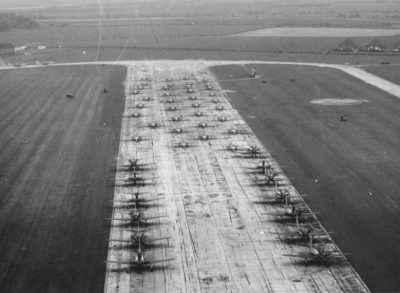About

Ford Market, based at the WW2 Clymping Airfield, started after a discussion at a local pub between farmers Peter and Susanne Hague and Sue Abbot and her sister Pat, together with market operator and butcher, Tom Malpass.
After much discussion and two years of planning applications and appeals, the inspector said that it was the best market site in the south of England. Ford Market opened in November 1988.
A tall hedge was planted beside the trading areas to protect stallholders and visitors from the prevailing winds and £70,000 was spent on road entrances at both ends of the site.
As Sunday Trading Laws were still in operation the market operated as a club in order for people to pay 10p to access the stalls. (The laws changed in 1994 so the market then had competition from local shops that could also open on a Sunday).
In 1998, the Saturday Car Boot was granted permission to operate and alongside the Sunday Market offered a different shopping experience for all. With this increasing popularity, facilities were needed and in 1999 an office and toilet block with disabled facilities were built. The Thursday Market was added for those who couldn’t make weekends and wanted a midweek activity.
Sadly, Tom Malpass died in 2002 but the market continued without a break in the capable hands of the new manager, Gary Brown who had been working at the market from the outset.
The aeroplane at the Ford end of the market is a Hunter found by Peter and was mounted to remind people of the history of the airfield (see below).
Ford Market has seen many special events
- The regular filming by the BBC of Put Your Money Where Your Mouth Is
- A church service led by Bishop Lindsay who walked down the market fully-robed, talking to traders and members of the public of all denominations
- A delegation from Russia who were made honorary members when they visited as they wanted to see a real English market
- A 24ft snowman was created as a result of clearing snow off the runways. People paid 50p for charity to guess when it would finally melt below one metre.
Ford Market’s USPs:
- Large areas of concrete perfect for year-round trading – no muddy feet and easily accessible for wheelchair users.
- Toilet facilities and trolleys to hire.
- Easy access and trading conditions 52 weeks of the year so no need to close down in the winter.
- A wide variety of things to buy – new goods in the Sunday Market and a wealth of secondhand, antiques and collectibles in the Boot Fairs.
Sunday Market Traders
The market is ever changing and has a varying range of products for sale each week.
- Butcher offering the best prices for the best meat
- Fresh fruit and veg
- Pet food and animal accessories
- Tools at bargain prices
- Plants, stone garden ornaments
- Footwear, workwear, ladies fashion, socks, hats and gloves
- Rugs and runners
- Mobile phone repair and accessories
- Kitchen and household products
- e-cigs and fluid
- Handbags and luggage
The History of the Airfield
For historians interested in the airfield, Ford was the world’s most famous intruder airfield and operated between 1918-1920 for RAF and American squadrons. The site became involved in early air-to-air flight refuelling experiments, and resumed military aviation connections from the end of 1937. Fleet Air Arm training units primarily employed Ford into WW2 but their base suffered heavy damage and loss of life following a ferocious attack by Junkers Ju87s on August 18 1940. As a result, the RAF quickly returned and Ford gained prominence in its best known role as various intruder squadrons (notably No. 23) sought out enemy-occupied territory to attack with considerable success. Operational duties gradually altered to also include fighter-bomber sorties as the airfield became heavily involved through the vital D-Day period and beyond.
Ford kept busy during peacetime as the Fleet Air Arm returned in the summer of 1945 to enable first-line squadrons to form and work up to full readiness. Another major event occurred in August 1951 when No. 800 Squadron formed at HMS Peregrine with Supermarine Attackers to become the first naval jet fighter unit. Eventually Ford closed in November 1958 but this did not signal the end of flying by any means as civil aircraft continued to employ the airfield until 1980.
Ford Airfield Market and Car Boot Sale
All enquiries: Nicholas Horsecroft - Market Manager
Tel: 07584485608 (No calls or messages will be taken on Monday or Tuesday or after 5pm throughout the week)
Email: info@fordairfieldmarket.co.uk

